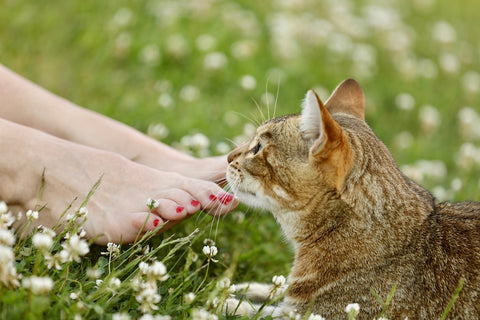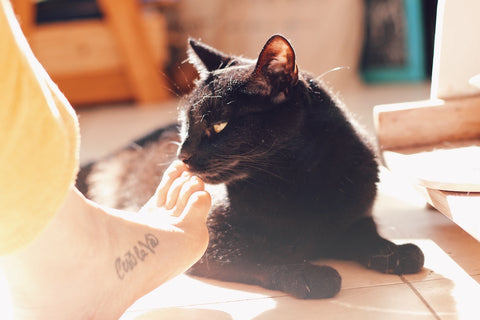Cat Foot Biting: Why Does My Cat Bite My Feet?
Cats are known for their quirky and sometimes unpredictable behavior. One common behavior that many cat owners encounter is their feline friend biting their feet. While it may seem like an adorable or playful gesture, understanding the underlying reasons for this behavior can help you and your cat have a better relationship.
The Science Behind Cat Foot Biting
Common Reasons Why Cats Bite Their Owners' Feet
Playfulness:
Cats are natural hunters and have a strong prey drive. When they see your feet moving, they might interpret it as an opportunity to engage in playful hunting behavior. Biting and pouncing on your feet can mimic hunting and play, and it's their way of staying active and stimulated.
Attention Seeking:
Cats are social animals that often seek attention from their owners. If your cat feels neglected or wants your attention, they might resort to biting your feet as a way to get you to interact with them. This is especially common if you're busy or not giving them the attention they desire.

Teething or Discomfort:
Kittens, in particular, may bite your feet when they are teething. Biting provides relief from the discomfort of growing new teeth. If your cat is experiencing dental issues or oral discomfort, they may also resort to biting as a coping mechanism.
Territorial Behavior:
Cats are territorial animals, and they may see your feet as part of their territory. Biting your feet can be a way for them to assert their dominance or mark their territory.
Overstimulation:
Cats have a threshold for how much physical interaction they can handle. If you're petting or playing with your cat too aggressively, they might become overstimulated, leading to them biting your feet as a way to signal that they need a break.
Inadequate Play or Exercise:
Insufficient physical and mental stimulation can lead to excess energy in cats. If your cat is not getting enough playtime or exercise, they may resort to biting your feet as a way to release pent-up energy.
How to Stop Your Cat From Biting Your Feet
If your cat has developed a habit of biting your feet and you'd like to put an end to this behavior, follow these steps to help stop your cat from biting your feet:
Provide Adequate Play and Exercise:
One of the main reasons cats bite feet is because they have excess energy to burn. Ensure your cat gets enough physical and mental stimulation through interactive play sessions with toys such as feather wands, laser pointers, and interactive puzzles. Engaging your cat in play before you sit or stand up can help reduce their inclination to bite.
Offer Appropriate Toys:
Redirect your cat's biting behavior by giving them appropriate toys to chew on or pounce at. Offer a variety of toys like feather toys, stuffed mice, or puzzle feeders to keep your cat entertained.
Use Positive Reinforcement:
Reward your cat when they exhibit good behavior by not biting your feet. Offer treats, praise, or affection as a form of positive reinforcement. This will encourage your cat to associate not biting your feet with positive experiences.
Stay Calm and Avoid Punishment:
If your cat does bite your feet, avoid reacting with anger or punishment, as this can worsen the situation and create anxiety in your cat. Instead, calmly and gently redirect their attention to an appropriate toy or object.
Set Boundaries:
Establish clear boundaries with your cat. If they start biting your feet, calmly say "no" and gently move your feet away. Consistency is key, and your cat will eventually learn that biting is not acceptable behavior.
Trim Your Cat's Claws:
Keeping your cat's claws trimmed can minimize the discomfort associated with their bites. Regularly trimming their claws will also help prevent accidental scratches when they do bite.
Avoid Rough Play:
Be mindful of your playtime interactions. Cats have different thresholds for play aggression, and it's important to recognize when your cat is becoming overstimulated. If you notice signs of overstimulation, such as dilated pupils or aggressive behavior, take a break and let your cat calm down.
Use Catnip or Cat Toys:
Catnip and cat toys can be used to redirect your cat's attention away from your feet. These can be especially useful when your cat is exhibiting play-biting behavior.
Use Cat Deterrents:
Consider using cat deterrent sprays or mats in areas where your cat is prone to biting your feet. These products emit odors or have textures that cats find unpleasant, which can deter them from the behavior.
Consult a Professional:
If the biting behavior is persistent and causing problems, consult with a veterinarian or a professional animal behaviorist. They can offer additional guidance and may be able to identify underlying issues that need to be addressed.
Be Patient:
Changing your cat's behavior takes time, so be patient and consistent in your efforts. Understand that it may not be possible to completely eliminate the behavior, but with consistent training, you can significantly reduce it.

Remember that every cat is unique, and the success of these methods may vary. It's important to tailor your approach to your cat's specific personality and needs. By implementing these strategies, you can foster a more harmonious relationship with your feline friend and minimize the issue of foot biting.
Leave a comment
